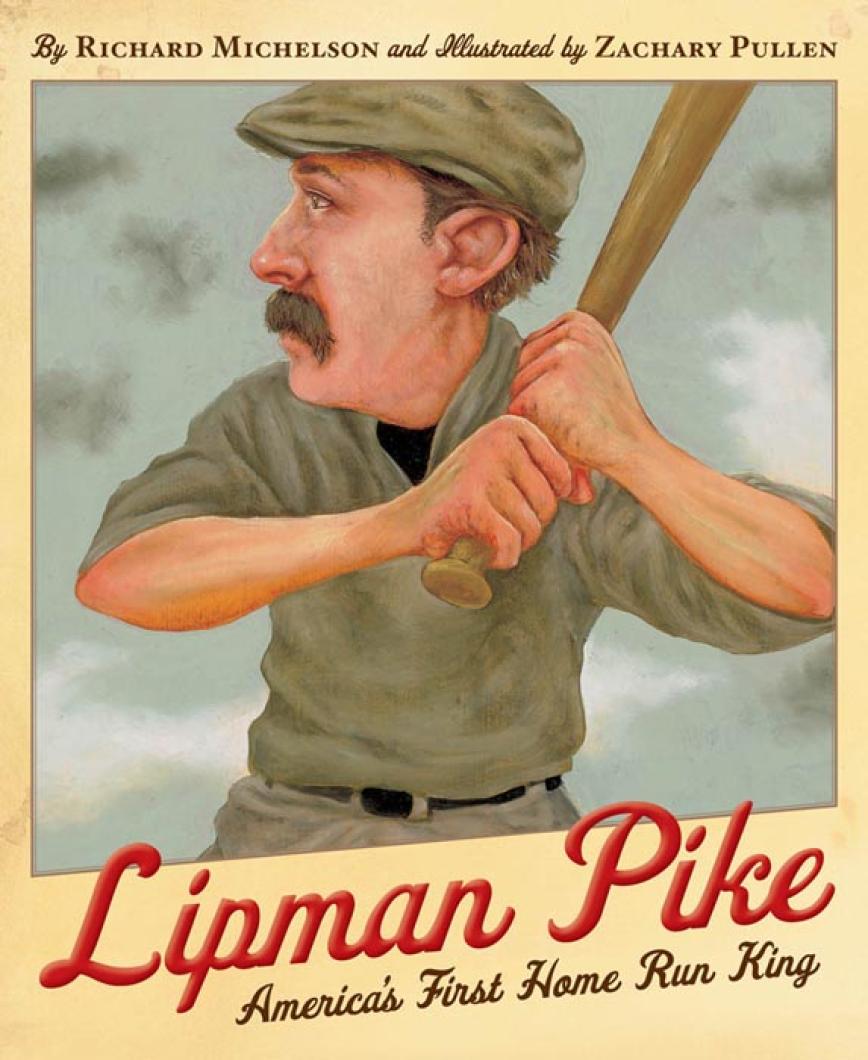LIPMAN PIKE: America’s First Home Run King . By Richard Michelson . Sleeping Bear Press. 32 pages, photographs. $16.95.
Keeping American history alive is of great importance, especially to seasonal resident Richard Michelson, who not long ago graced the bookshelves of children’s literature with Busing Brewster, a story of 1970’s enforced busing. Now Mr. Michelson (author), along with Zachary Pullen (illustrator), has produced yet another narrative glorifying the American Dream. The dream to be free, to make choices and to succeed, no exceptions. Entitled Lipman Pike: America’s First Home Run King, Mr. Michelson’s book puts down on beautifully illustrated glossy pages the story of America’s first paid and Jewish professional baseball player.
Having arrived from Holland in the first half of the 19th century, Mr. and Mrs. Pike have set up shop in the form of a haberdashery in Brooklyn. This being a family endeavor, both of their sons, Boaz and Lipman, in chronological succession, who were born after their parents arrival in the new world, work at the shop. The opening page states that “Lipman Pike hated to stand still. From behind the cashbox he shook out his left leg, and then his right.” Simultaneously, the door bell jingles and in comes Mrs. Kaufman, who traveled from the old world to the new with Mr. and Mrs. Pike. She is shopping for her son. In 14 seconds flat, Lipman, whose father offers the best service in the city, dashes from the counter to the front window display and back with a pair of boy’s stockings for Mrs. Kaufman.
A round trip of 90 feet, the exact distance between home plate and first base. A mere coincidence? Probably not, for Lipman dreams of playing baseball, or Base as it was originally deemed. But the odds are against him. A Jewish boy does not chase balls around, a Jewish boy does his chores and then exercises his mind, according to Mrs. Lipman. Mr. Lipman, however, who concurs with his wife’s emphasis on education, sees that in America “even the smartest young men chase balls like silly boys” and he wants his sons to fit in. Thus, through parental endearment, history is made.
Lipman Pike: America’s First Home Run King is indeed the story of the aforementioned American Dream. Yet it is so much more as well. It is the age-old, everlasting struggle of cultures melding together while being tugged from both sides. A strenuous generational battle that at times finds a harmonious middle ground, at other times sways to the new, sways to the old. Situations that offer “freedom and justice for all” are epicenters for these struggles and are bound to attract physical and mental beings from far and near, each bringing along their own traditions, thoughts and values. All which may, or more likely, will, clash with those of others arriving from distinctly opposing latitudes. The old, the new. The far, the near. The traditional, the contemporary. And to this timeless issue, along with the American Dream, Lipman Pike respectfully speaks to the topic of what we now call “letting go.” Since the dawn of creation, be it biblical or big bang, parents have had to let go of their children so that they can succeed. Parents; old, far and traditional. Children; new, near and contemporary. There is no avoiding it and it is best done with understanding and strength, with guidance and acceptance, with knowledge. So, Lipman, blessed with these attributes, follows his dream. And as Mr. Michelson states in the second section of this book The Rest is History.
Divided into three parts, Lipman Pike is a veritable trove of information. The first section, being the story itself, is followed by two more sections, a continuation of the factual history of Lip Pike and an author’s note. Readers, young and old, will find little known historical facts of interest throughout this book. Lipman Pike will fit nicely into any family collection or school library, enhancing the knowledge and appreciation of history for all.
Richard Michelsen will be discussing Lipman Pike at the Bunch of Grapes Bookstore in Vineyard Haven at 10:30 a.m., Saturday, August 20.






Comments
Comment policy »